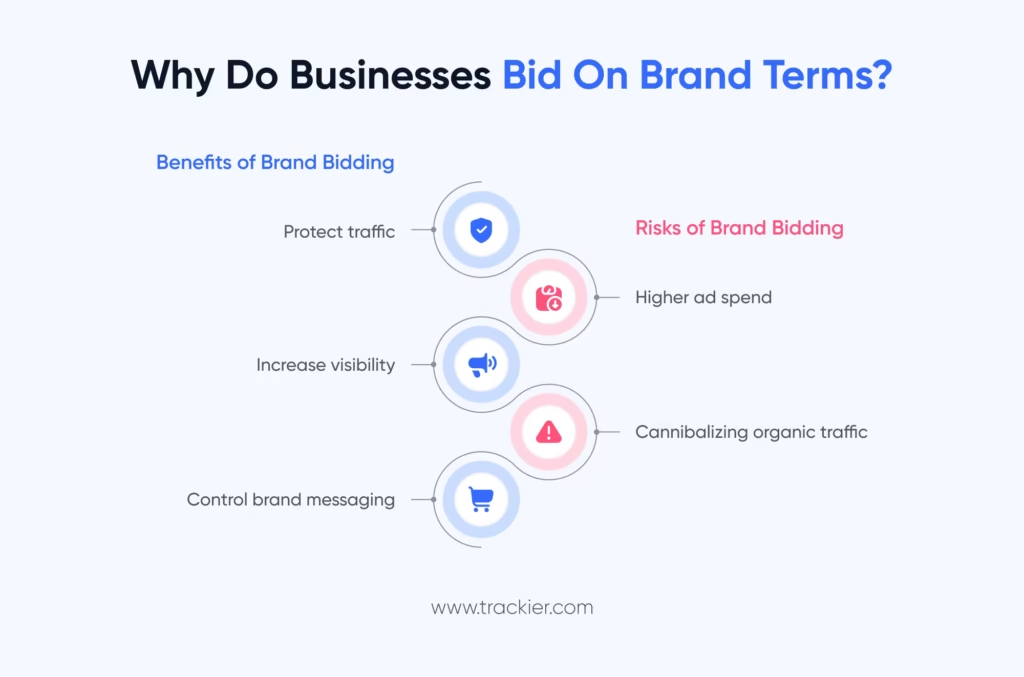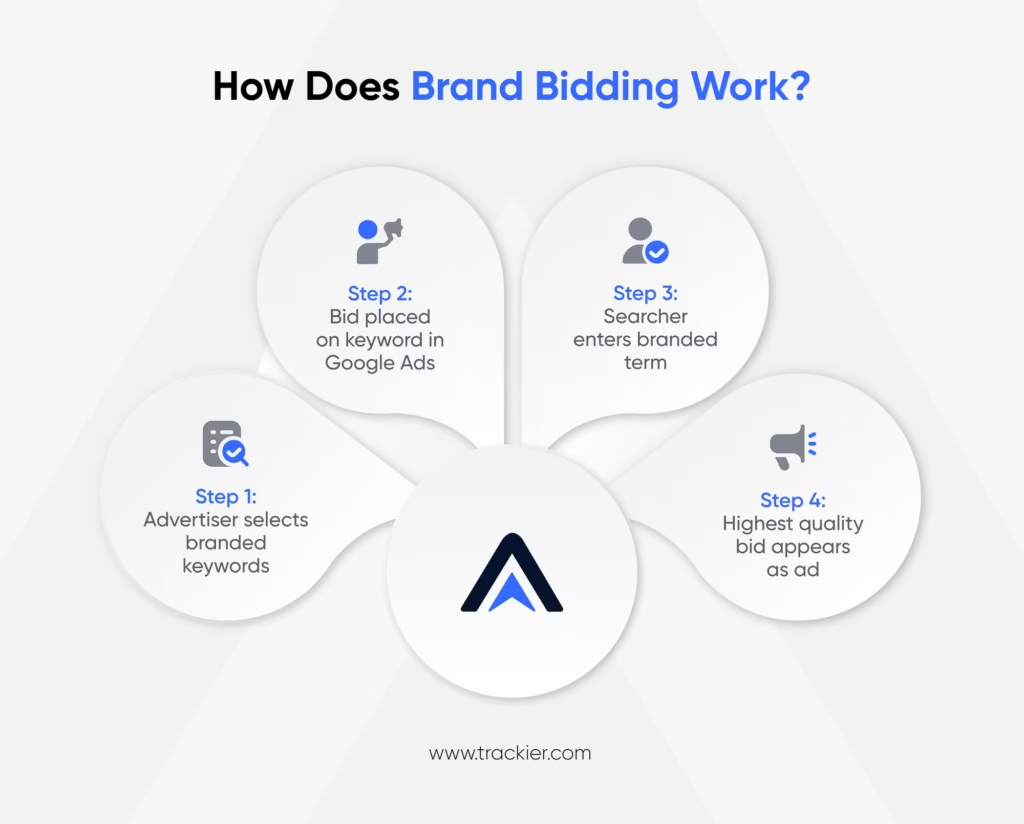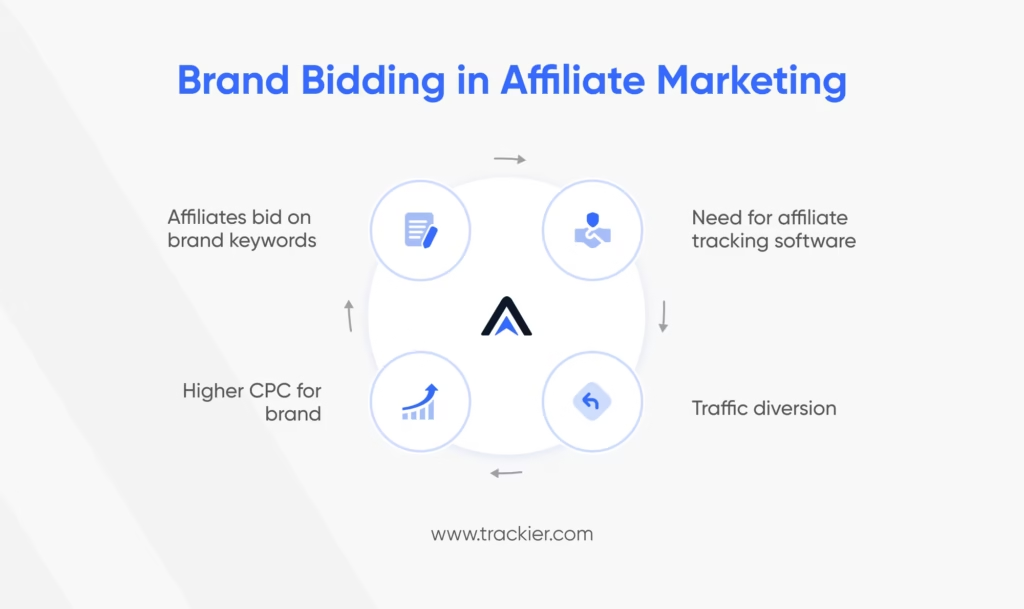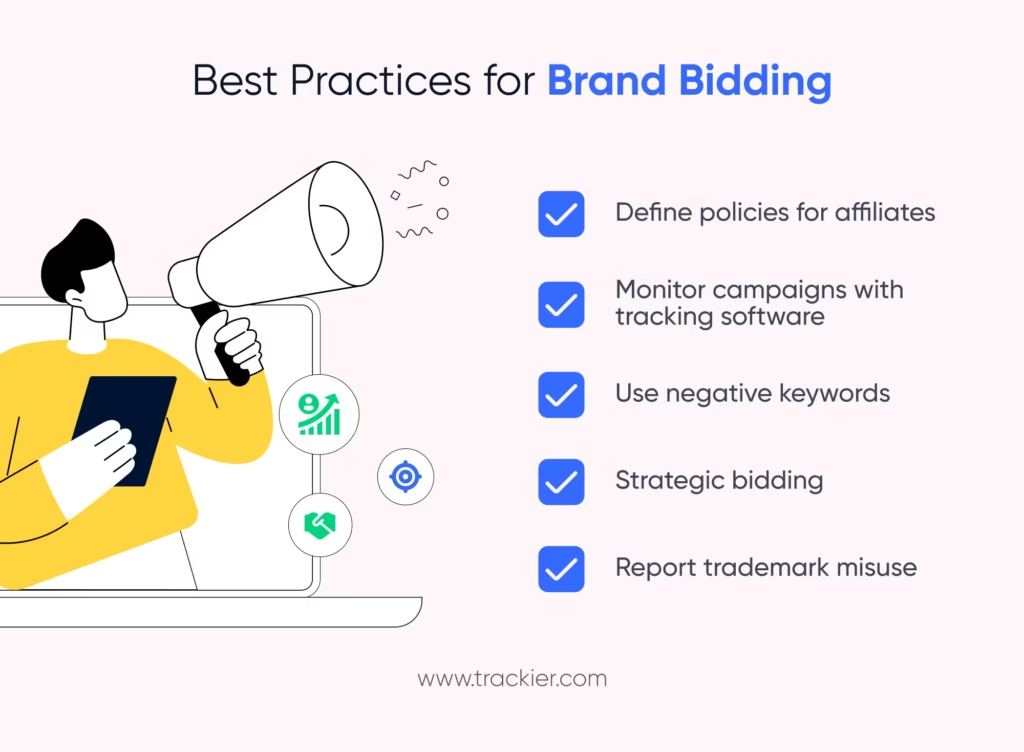Businesses invest heavily in ads to appear at the top of search results. Yet, even after investing in SEO, many businesses find competitors or affiliates outranking them by bidding on branded keywords. This raises advertising expenses and creates unnecessary competition. Businesses can identify misuse, safeguard brand terms, and easily manage their paid campaigns with the correct strategies and tools, including affiliate tracking software. Brand bidding plays a central role in this process.
What is Brand Bidding?
Bidding on a brand name or branded keywords in paid advertising networks such as Google Ads is known as brand bidding. An affiliate or business might, for instance, bid on “Nike shoes” rather than a generic term like “running shoes.”
When people ask what is brand bidding, the answer is simple: it’s a strategy where businesses, competitors, or affiliates pay to display ads whenever users search for particular branded terms.
Businesses can bid on brand terms in digital marketing to ensure visibility and stop rivals from stealing affiliate traffic. Affiliates can also include brand bidding in their campaigns, which often calls for extra care to ensure compliance with program guidelines.
Why Do Businesses Bid on Brand Terms?
Many people question why they should bid on brand terms when there are already organic listings or brand awareness. The main reasons include:

- Increased visibility: A brand gets dominance in search results when it owns both organic and sponsored ads.
- Blocking competitors: In an attempt to redirect traffic, competitors frequently attempt to bid on branded keywords. It is avoided by running brand advertisements.
- Messaging control: Paid advertisements give businesses the opportunity to bring attention to deals, promotions, or landing sites that may not be visible in organic results.
- Preserving conversions: The brand runs the risk of losing traffic if affiliates or resellers are running advertisements. This leakage is avoided through the use of approved brand monitoring and marketing.
Paying for clicks on your own brand might seem pointless, but many businesses view it as a way to prevent losing important visitors.
How Does Brand Bidding Work?
The mechanics of paid advertising must be studied to understand brand bidding.

- Branded keywords like “Apple iPhone” or “Coca-Cola deals” are chosen by companies or affiliates.
- They use platforms such as Google Ads to place bids on these terms.
- The ad that appears when a person searches is determined by the bid with the best quality.
When most marketers discuss bidding on branded keywords, they are referring to this procedure. By searching for particular names, a brand or rival can target an audience that already shows intent.
To draw potential buyers to their own products, a competitor can, for instance, decide to bid on brand phrases like “Samsung phone.”
Bidding on Competitor Brands
Bidding on competitor brand names is a controversial but common practice in digital marketing. For example, a software company may target searches for the name of a competitor’s brand with advertisements.
Benefits:
- Able to draw in highly targeted traffic that is actively looking for alternatives.
- Increases reach by focusing on the existing audience of a competitor.
Risks:
- If consumers believe they have been misled, it could harm the brand’s reputation.
- It can lead to legal problems if trademarked names are misused in advertising text.
While bidding on rival brand terms might provide benefits, most businesses do it carefully to prevent reputational harm or costly bidding battles.
Brand Bidding in Affiliate Marketing
So, what is brand bidding in affiliate marketing? It occurs when affiliates use a brand’s own keywords in their ads. An affiliate marketing a chain of hotels, for instance, would use the hotel’s name as one of the keywords in their Google Ads campaign.
This technique is often opposed by brands because:
- Affiliates can increase CPCs for official brand advertising.
- It leads to unnecessary rivalry between the brand and its affiliates.
- Some affiliates may misrepresent the brand in ad copy.

Businesses use affiliate tracking software and monitoring tools to identify affiliates who bid on brand terms to stop misuse. Affiliate agreements often make it clear whether brand bidding is allowed or not.
The Bidding Process in Digital Marketing
When marketers discuss a bidding process, they’re talking about how Google advertisements and other platforms choose which advertisements to display. The bidding process considers:
- Bid amount: The maximum cost an advertiser is willing to pay.
- Ad quality score: Ad, landing page, and keyword relevancy.
- Competition: The quantity of ads competing for the same parameters.
When someone searches for a brand name, this procedure in brand bidding decides whether the official brand or a competitor shows up at the top of the results.
Pros and Cons of Brand Bidding
Each marketing tactic has strengths and limitations, and brand bidding is the same. It has risks like increased advertising expenses and disputes with affiliates, but it may also secure important traffic. Businesses can make educated choices regarding whether and how to use brand bidding by considering the pros and cons.
Pros:
- Protects branded traffic from rivals.
- Increases exposure in both organic and paid listings.
- Permits more control over messaging and offers.
- Increases your chance of obtaining clicks with high intent.
Cons:
- Increases advertising expenses unnecessarily.
- Creates internal rivalry between the brand and its affiliates.
- May result in negative client experiences if improperly handled.
- Needs ongoing oversight to prevent misuse.
Best Practices for Brand Bidding
The following can be done by businesses to effectively deal with brand bidding:

- Establishing clear guidelines: State whether brand bidding can be utilized in campaigns by affiliates.
- Monitor activity: For locating mistakes, utilize ad monitoring software and affiliate tracking software.
- Utilize negative keywords: To avoid lost clicks, add competitor terms or phrases.
- Bidding strategically: Monitor significant branded keywords without exceeding budget.
- Guard your trademarks: In case of need, report any misuse of your brand name in rival ads.
Businesses can use brand bidding to improve their online visibility while reducing risks by implementing these best practices.
Conclusion
Brand bidding is a powerful but complex part of digital advertising. It exists to help businesses protect valued traffic with repeated visibility and keep competitors from bidding on brand terms. Brand bidding has risks, too, including conflict risk, affiliate misuse, and expenditures. Brands can easily decide when and how to bid on brand terms with the correct strategy, supervision, and well-defined policies.
FAQs
What is a brand bidding?
The process of running paid ads on branded keywords, such as a company name or product, is known as brand bidding. The method is employed by companies, competitors, and affiliates to increase search traffic. Though it helps gain visibility, improper handling can result in high advertising expenses.
What is a bidding process?
Platforms like Google Ads use the bidding process to decide which ad will show up in search results. The platform evaluates factors, including bid amount, ad quality, and competitiveness, once advertisers place a bid for particular keywords. The method ensures that users see the most competitive, relevant advertisements.
What is a bidding strategy?
Advertisers determine their ad budget via a bidding system. Bidding is done manually, automatically, or by prioritizing specific results, such as clicks or conversions. Firms can opt to use brand bidding strategies that value visibility on branded terms for safeguarding their traffic against affiliates or competitors.
What is bidding in digital marketing?
In digital marketing, bidding is the method of competing for display networks’ or search engines’ ad positions. The technology decides which ad is displayed based on bids placed by advertisers on audiences or keywords. The goal of brand bidding is to get clicks from customers who are already interested in the brand by placing offers for branded keywords.